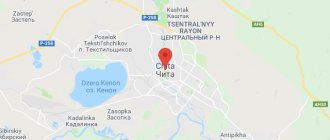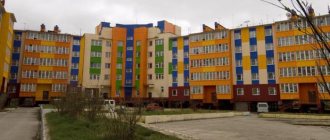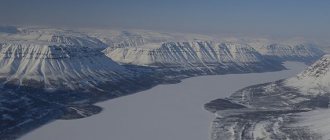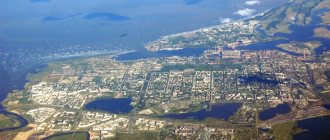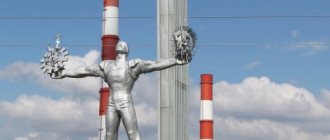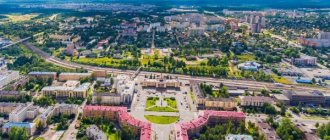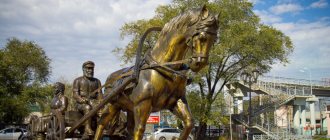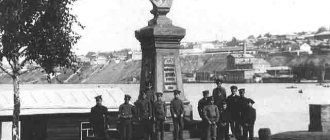This term has other meanings, see Terek (meanings).
| City Terek Kabard.-Cherk. Terch kaale Coat of arms |
| A country | Russia, Russia |
| Subject of the federation | Kabardino-BalkariaKabardino-Balkaria |
| Municipal district | Tersky |
| urban settlement | Terek |
| Coordinates | 43°29′00″ n. w. 44°08′20″ E. d. / 43.48333° n. w. 44.13889° E. d. / 43.48333; 44.13889 (G) [www.openstreetmap.org/?mlat=43.48333&mlon=44.13889&zoom=12 (O)] (Z)Coordinates: 43°29′00″ N. w. 44°08′20″ E. d. / 43.48333° n. w. 44.13889° E. d. / 43.48333; 44.13889 (G) [www.openstreetmap.org/?mlat=43.48333&mlon=44.13889&zoom=12 (O)] (I) |
| Head of a city settlement | Khapazhev Timur Urusbievich |
| Based | in 1876 |
| Former names | until 1920 Murtazovo (Mertezey) |
| City with | 1967 |
| Square | 12 km² |
| Center height | 254 |
| Climate type | humid moderate (Dfa) |
| Population | ↘19,426[1] people (2016) |
| Density | 1618.83 people/km² |
| National composition | Kabardians, Russians |
| Confessional composition | Sunni Muslims, Orthodox |
| Names of residents | Terchane, Terchanin, Terchanka |
| Timezone | UTC+3 |
| Telephone code | +7 86632 |
| Postcode | 361 200 |
| Postal codes | 361 201 — 361 203 |
| Vehicle code | 07 |
| OKATO code | [classif.spb.ru/classificators/view/okt.php?st=A&kr=1&kod=83235501000 83 235 501 000] |
| Precipitation rate | 500—700/year |
| Terek Moscow |
| Nalchik Terek |
Audio, photo and video
on Wikimedia Commons
K: Settlements founded in 1876
Terek
(Kabard-Cherk. Terch kaale) is a city in the Republic of Kabardino-Balkaria. The administrative center of the Terek region and the municipal formation "Urban settlement Terek".
Geography
The city is located in the western part of the Terek region, on the right bank of the Terek River. Located 53 km east of the city of Nalchik (by road).
The area of the urban settlement is 12 km2. The length of the city from north to south is 5 km, from west to east – 3 km.
It borders on the lands of settlements: Arik in the north, Deyskoye in the east, International and Aleksandrovskaya in the west.
The settlement is located in the foothills of the republic, on the sloping Kabardian Plain. The terrain is relatively flat with hilly hills in the west and north. The average altitude in the municipality is 254 meters above sea level.
The hydrographic network is represented by the Terek River. The river valley is occupied by dense riverine forests. To the north of the city there are cascades of small canals designed to irrigate the agricultural lands of the region. To the north of the city is the Arik Oaks forest.
The climate is humid and temperate with warm summers and cool winters. The average annual air temperature is about +10.5°C, and ranges from an average of +22.5°C in July to an average of -2.0°C in January. The average daily air temperature ranges from −5°С to +10°С in winter, and from +16°С to +30°С in summer. Minimum temperatures in winter rarely fall below -12°C; in summer, maximum temperatures reach +35°C. The average annual precipitation is about 650 mm. The bulk of precipitation falls between April and June. The main winds are east and north-west.
River study, research
The study of the Terek began after the arrival of the Russian Cossacks. During the XV - XIX centuries. studies of the river bed were carried out to determine its transport potential. During the USSR period, the study of the reservoir continued.
7 hydrological checkpoints were built through which the transit of petroleum products in the Caucasus was carried out. In the 21st century, hydrological points continue to study the Terek and maintain the integrity of its delta.
Story
The founding date of the city of Terek is considered to be 1876, when the new Murtazovo railway station was put into operation. The new station was formed on the lands of the Kabardian nobles Murtazov, in whose honor the station received its name. At that time, the station's maintenance personnel were located in only three residential buildings. Over the years, other residential and commercial buildings, as well as small private establishments, began to form around the station.
In 1920, the district congress of Soviets of Lesser Kabarda took place. Based on the results of the meeting, it was decided to build a new settlement near the station. According to the developed plan, the new settlement was to become the district center of Lesser Kabarda. At the same time, the district congress chose the name Terek for the new settlement.
Initially, it was planned to retain the name Murtazovo for this settlement. But due to the policy pursued by the established Soviet government to rename Kabardian settlements that bore the surnames of their princely and noble families, the new settlement was named after the Terek River, on the right bank of which the settlement was located[2].
In 1935, Terek was given the status of an urban settlement. In 1945, the status of a workers' village.
During the Great Patriotic War at the end of 1942, the village was occupied by German troops for several weeks. Released at the beginning of 1943. In memory of those killed, monuments and monuments have been erected in the city.
In August 1967, a Decree of the Presidium of the Supreme Soviet of the RSFSR was published on the transformation of the village of Terek into a city of regional subordination.
Tributaries
The Terek on the map of Russia crosses several small rivers flowing into its bed.
The following table shows the characteristics of the major tributaries of the Terek:
Ardon
| Name of inflow | Length, km | Total basin area, km2 |
| Ardon | 102 | 2700 |
| Giseldon | 80 | 604 |
| Fiagdon | 75 | 714 |
| Urukh | 104 | 1280 |
| Malka | 210 | 10 000 |
| Sunzha | 278 | 12 000 |
Most of the tributaries of the Terek are part of a system of power plants that produce electricity for populated areas of the North Caucasus Federal District.
Population
| Population | |||||||
| 1939 | 1959[3] | 1970[4] | 1979[5] | 1989[6] | 1992[7] | 1996[7] | 1998[7] |
| 4500 | ↗6647 | ↗10 422 | ↗12 335 | ↗16 559 | ↗17 800 | ↗18 500 | →18 500 |
| 2000[7] | 2001[7] | 2002[8] | 2003[7] | 2005[7] | 2006[7] | 2007[7] | 2008[7] |
| →18 500 | →18 500 | ↗20 255 | ↗20 300 | ↘20 100 | ↘19 900 | ↘19 800 | →19 800 |
| 2009[9] | 2010[10] | 2011[7] | 2012[11] | 2013[12] | 2014[13] | 2015[14] | 2016[1] |
| ↗19 843 | ↘19 170 | ↗19 200 | ↗19 273 | ↗19 329 | ↗19 446 | ↘19 442 | ↘19 426 |
As of January 1, 2016, in terms of population, the city was in 692nd place out of 1112[15] cities in the Russian Federation[16]
Density - 1618.83 people/km2.
National composition
According to the 2010 All-Russian Population Census[17]:
| People | Number of people, people | Share of the total population, % |
| Kabardians (Circassians) | 16 400 | 85,6 % |
| Russians | 1 917 | 10,0 % |
| Ossetians | 219 | 1,1 % |
| other | 634 | 3,3 % |
| Total | 19 170 | 100,00 % |
Sex and age composition of the population
According to the 2010 All-Russian Population Census[18]:
| Age | Men, persons | Women, persons | Total number, people | Share of the total population, % |
| 0 – 14 years | 1 743 | 1 765 | 3 508 | 18,3 % |
| 15 – 59 years | 6 107 | 6 993 | 13 100 | 68,3 % |
| from 60 years old | 908 | 1 654 | 2 562 | 13,4 % |
| Total | 8 758 | 10 412 | 19 170 | 100,0 % |
Men - 8,758 people. (45.7%). Women - 10,412 people. (54.3%)[19].
The average age of the population is 35.5 years. The median age of the population is 33.6 years.
The average age of men is 33.6 years. The median age of men is 31.2 years.
The average age of women is 37.0 years. The median age of women is 35.8 years.
Education
Educational institutions in the city
| Educational institution | Type of institution | Address |
| Modern Humanitarian Academy (branch in Terek) | higher | st. Lenina, 25 |
| State Vocational School No. 18 | specialized secondary | st. Beslaneeva, 2 |
| Municipal educational institution Lyceum No. 1 | average | st. Lermontova, 74 |
| Municipal educational institution secondary school No. 2 | average | st. Pushkina, 119 |
| Municipal educational institution secondary school No. 3 | average | st. Panagova, 114 |
| Municipal educational institution secondary school No. 4 | average | st. Terskaya, 98 |
| Republican boarding school No. 8 | basic general | st. Fanzieva, 6 |
| Progymnasium No. 1 | initial | st. Panagova, 118 |
| Progymnasium No. 2 | initial | st. Beslaneeva, 3A |
| Kindergarten No. 3 “Nur” | initial | st. Kankosheva, 51 |
| Preschool department No. 4 | initial | st. Nogmova, 7 |
| Preschool department No. 5 | initial | st. Fanzieva, 10 |
Fish and fishing
A large variety of fish are introduced into the river basin. Valuable species spawn in the dam of the Terek-Kum hydroelectric complex: sturgeon, stellate sturgeon, Caspian salmon and kutum. The tourist infrastructure on the river is not very developed, so when going fishing you need to take a tent with you or rent accommodation in one of the villages in advance. In Kizlyar you can book a room in a hotel or sanatorium.
Excerpt characterizing Terek (city)
He doesn't have any plan; he is afraid of everything; but the parties seize on him and demand his participation. He alone, with his ideal of glory and greatness developed in Italy and Egypt, with his madness of self-adoration, with his audacity of crimes, with his sincerity of lies - he alone can justify what is about to happen. He is needed for the place that awaits him, and therefore, almost independently of his will and despite his indecision, despite the lack of a plan, despite all the mistakes he makes, he is drawn into a conspiracy aimed at seizing power, and the conspiracy is crowned with success . He is pushed into the meeting of the rulers. Frightened, he wants to run away, considering himself dead; pretends to faint; says meaningless things that should destroy him. But the rulers of France, previously smart and proud, now, feeling that their role has been played, are even more embarrassed than he is, and say the wrong words that they should have said in order to retain power and destroy him. Chance, millions of coincidences give him power, and all people, as if by agreement, contribute to the establishment of this power. Accidents make the characters of the then rulers of France subservient to him; accidents make the character of Paul I recognizing his power; chance conspires against him, not only not harming him, but asserting his power. An accident sends Enghien into his hands and inadvertently forces him to kill, thereby, stronger than all other means, convincing the crowd that he has the right, since he has the power. What makes it an accident is that he strains all his strength on an expedition to England, which, obviously, would destroy him, and never fulfills this intention, but accidentally attacks Mack with the Austrians, who surrender without a battle. Chance and genius give him victory at Austerlitz, and by chance all people, not only the French, but all of Europe, with the exception of England, which will not take part in the events that are about to take place, all people, despite the previous horror and disgust for his crimes, now they recognize his power, the name he gave himself, and his ideal of greatness and glory, which seems to everyone to be something beautiful and reasonable. As if trying on and preparing for the upcoming movement, the forces of the West several times in the years 1805, 6, 7, 9 rush to the east, growing stronger and stronger. In 1811, the group of people that had formed in France merged into one huge group with the middle peoples. Together with an increasing group of people, the power of justification of the person at the head of the movement further develops. In the ten-year preparatory period preceding the great movement, this man is brought together with all the crowned heads of Europe. The exposed rulers of the world cannot oppose the Napoleonic ideal of glory and greatness, which has no meaning, with any reasonable ideal. One in front of the other, they strive to show him their insignificance. The King of Prussia sends his wife to curry favor with the great man; the Emperor of Austria considers it a mercy that this man accepts the daughter of the Caesars into his bed; the pope, guardian of the sacred things of the people, serves with his religion the exaltation of a great man. It is not so much that Napoleon himself prepares himself to fulfill his role, but rather that everything around him prepares him to take upon himself the full responsibility of what is happening and is about to happen. There is no act, no crime or petty deception that he has committed that is not immediately reflected in the mouths of those around him in the form of a great deed. The best holiday that the Germans can come up with for him is the celebration of Jena and Auerstätt. Not only is he great, but his ancestors, his brothers, his stepsons, his sons-in-law are great. Everything is done in order to deprive him of the last power of reason and prepare him for his terrible role. And when he is ready, so are the forces. The invasion is heading east, reaching its final goal - Moscow. The capital is taken; The Russian army is more destroyed than enemy troops were ever destroyed in previous wars from Austerlitz to Wagram. But suddenly, instead of those accidents and genius that had so consistently led him so far in an unbroken series of successes towards his intended goal, there appears a countless number of reverse accidents, from a runny nose in Borodino to frost and the spark that lit Moscow; and instead of genius there are stupidity and meanness, which have no examples. The invasion runs, comes back, runs again, and all the coincidences are now no longer for, but against it. There is a counter-movement from east to west with remarkable similarity to the previous movement from west to east. The same attempts at movement from east to west in 1805 - 1807 - 1809 precede the great movement; the same clutch and group of huge sizes; the same pestering of the middle peoples to the movement; the same hesitation in the middle of the path and the same speed as you approach the goal. Paris - the ultimate goal has been achieved. Napoleonic government and troops are destroyed. Napoleon himself no longer makes sense; all his actions are obviously pathetic and disgusting; but again an inexplicable accident occurs: the allies hate Napoleon, in whom they see the cause of their disasters; deprived of strength and power, convicted of villainy and deceit, he would have to appear to them as he appeared to them ten years ago and a year after - an outlaw robber. But by some strange chance no one sees this. His role is not over yet. A man who ten years ago and a year after was considered an outlaw robber is sent on a two-day journey from France to an island given to him in possession with guards and millions who pay him for something. The movement of peoples begins to settle into its shores. The waves of the great movement have subsided, and circles are formed on the calm sea, in which diplomats rush, imagining that they are the ones causing the lull in the movement. But the calm sea suddenly rises. It seems to diplomats that they, their disagreements, are the reason for this new onslaught of forces; they expect war between their sovereigns; The situation seems insoluble to them. But the wave, the rise of which they feel, is not rushing from where they expect it. The same wave is rising, from the same starting point of movement - Paris. The last surge of movement from the west is taking place; a splash that should resolve the seemingly intractable diplomatic difficulties and put an end to the militant movement of this period. The man who devastated France, alone, without a conspiracy, without soldiers, comes to France. Every watchman can take it; but, by a strange coincidence, not only does no one take it, but everyone greets with delight the man whom they cursed the day before and will curse in a month. This person is also needed to justify the last collective action. The action is completed. The last role has been played. The actor was ordered to undress and wash off the antimony and rouge: he would no longer be needed. And several years pass in which this man, alone on his island, plays a pathetic comedy in front of himself, petty intrigues and lies, justifying his actions when this justification is no longer needed, and shows the whole world what it was like what people took for strength when an invisible hand guided them. The manager, having finished the drama and undressed the actor, showed him to us. - Look what you believed! Here he is! Do you see now that it was not he, but I who moved you? But, blinded by the power of the movement, people did not understand this for a long time. The life of Alexander I, the person who stood at the head of the countermovement from east to west, is even more consistent and necessary. What is needed for that person who, overshadowing others, would stand at the head of this movement from east to west? What is needed is a sense of justice, participation in European affairs, but distant, not obscured by petty interests; what is needed is a predominance of moral heights over one’s comrades—the sovereigns of that time; a meek and attractive personality is needed; a personal insult against Napoleon is needed. And all this is in Alexander I; all this was prepared by countless so-called accidents of his entire past life: his upbringing, his liberal initiatives, his surrounding advisers, Austerlitz, Tilsit, and Erfurt. During a people's war, this person is inactive, since he is not needed. But as soon as the need for a common European war arises, this person at that moment appears in his place and, uniting the European peoples, leads them to the goal. The goal has been achieved. Since the last war of 1815, Alexander is at the height of possible human power. How does he use it? Alexander I, the pacifier of Europe, a man who from his youth strove only for the good of his people, the first instigator of liberal innovations in his fatherland, now that he seems to have the greatest power and therefore the opportunity to do the good of his people, while Napoleon exile makes childish and deceitful plans about how he would make humanity happy if he had power, Alexander I, having fulfilled his calling and sensing the hand of God on himself, suddenly recognizes the insignificance of this imaginary power, turns away from it, transfers it into the hands of those despised by him and despised people and says only: “Not to us, not to us, but to your name!” I am a man too, just like you; leave me to live as a human being and think about my soul and God. Just as the sun and each atom of the ether is a ball, complete in itself and at the same time only an atom of a whole inaccessible to man due to the enormity of the whole, so each personality carries within itself its own goals and, at the same time, carries them in order to serve common goals inaccessible to man. . A bee sitting on a flower stung a child. And the child is afraid of bees and says that the purpose of a bee is to sting people. The poet admires a bee digging into the calyx of a flower and says that the bee’s goal is to absorb the aroma of flowers. The beekeeper, noticing that the bee is collecting flower dust and bringing it to the hive, says that the bee's goal is to collect honey. Another beekeeper, having studied the life of a swarm more closely, says that the bee collects dust to feed young bees and breed the queen, and that its goal is to procreate. The botanist notices that, by flying with the dust of a dioecious flower onto the pistil, the bee fertilizes it, and the botanist sees the bee’s purpose in this. Another, observing the migration of plants, sees that the bee promotes this migration, and this new observer can say that this is the purpose of the bee. But the final goal of the bee is not exhausted by either one, or the other, or the third goal, which the human mind is able to discover. The higher the human mind rises in the discovery of these goals, the more obvious to it is the inaccessibility of the final goal.
